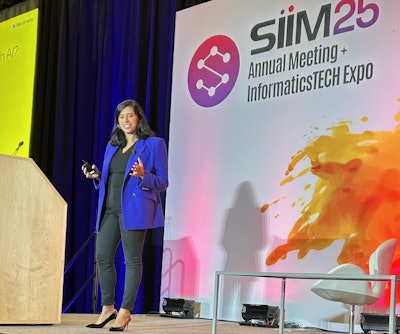PORTLAND – If you believe in the future of health care AI, you have to engage in politics, according to U.S. policy expert Rohini Kosoglu.
Kosoglu delivered the keynote address during the May 21 opening session of the Society for Imaging Informatics in Medicine (SIIM) annual meeting. She encouraged attendees to use their voices before the rules are written for them.
 AI policy expert Rohini Kosoglu delivered the keynote address at the opening session of SIIM on May 21.
AI policy expert Rohini Kosoglu delivered the keynote address at the opening session of SIIM on May 21.
“There is no question that we are in the middle of a technological revolution. The question in front of you will be, who wins at the end of this revolution?” she said.
Kosoglu served as deputy assistant to the president and domestic policy adviser to the vice president in the Biden-Harris White House. She currently serves as a policy fellow at the Stanford Institute for Human-Centered Artificial Intelligence (HAI), among other roles. She noted that over the next decade, trillions of dollars will flow into the AI healthcare sector, and whether or not that will translate to material changes that improve society depends on engaging in politics.
Rise of AI
Seminal moments in the AI revolution in health care included the first clearance by the U.S. Food and Drug Administration of a diagnostic AI algorithm in 2018 for use in digital retinopathy. The algorithm is “autonomous,” which means it can be used without physician oversight, Kosoglu explained.
But a less obvious moment occurred in September 2020, when JAMA released a study, “Geographic Distribution of US Cohorts Used to Train Deep Learning Algorithms.” The authors revealed systemic bias in clinical applications of deep learning, with patient cohorts used to train algorithms overwhelmingly based in Massachusetts, California, and New York.
“What was really interesting about that was we were in the middle of a presidential election. A lot of people had to form opinions about how they felt about the future of health care AI, and all of a sudden, you heard people citing these three states all the time in the conversation,” she said.
Ultimately, that is how the conversations around equity started to shift toward making sure that there is geographic equity in data sets and how models can be trained better, according to Kosoglu.
Trifecta in Washington State: How it counted
In her address, Kosoglu asked attendees to vote via a QR code on several questions related to politics in health care. One was, “What was the pivotal factor in the nation's first comprehensive data health data privacy law in 2023?”
One answer option was the surge in demand for consumer digital health privacy, which most attendees selected.
According to Kosoglu, however, the pivotal factor was that in November 2022, Democrats won a trifecta in Washington State elections. This allowed AI privacy advocates to push through the first legislation to be signed by a governor -- forbidding the use of AI algorithms that lead to discrimination in healthcare, for instance, in the U.S.
“And you can now see that there's a patchwork of state laws because of Washington having done theirs,” she said.
Take-home message
Ultimately, shifts in policy don’t come out of thin air, Kosoglu said. They are shaped by elections, coalitions, and trade-offs you don’t always see in the rule text, she noted. Look at the power and not just the paperwork, she urged, and watch state attorney generals and governors because that’s where the privacy patchwork starts.
Finally, if you believe in health AI, political literacy is a strategic must, Kosoglu said.
“Politics at its heart, for all of us that work day in and day out, is really the art of who gets what, when, and how. And so we rightfully have a ton of disdain around what our politics involve, but I am here to tell you that we can't disengage from that,” she concluded.



















